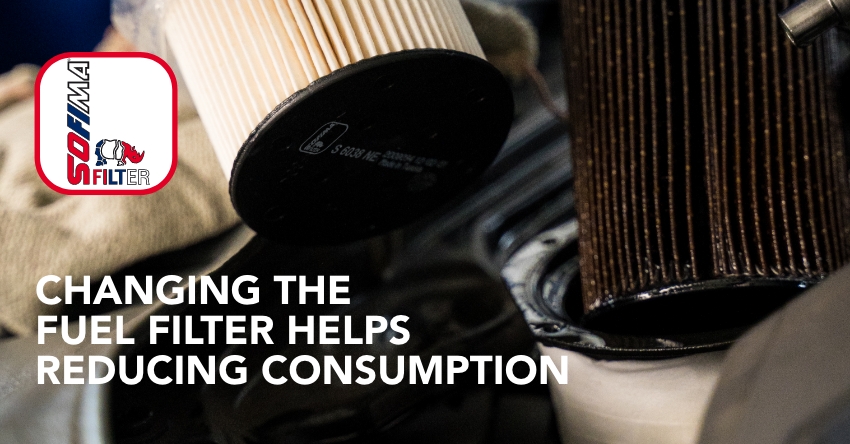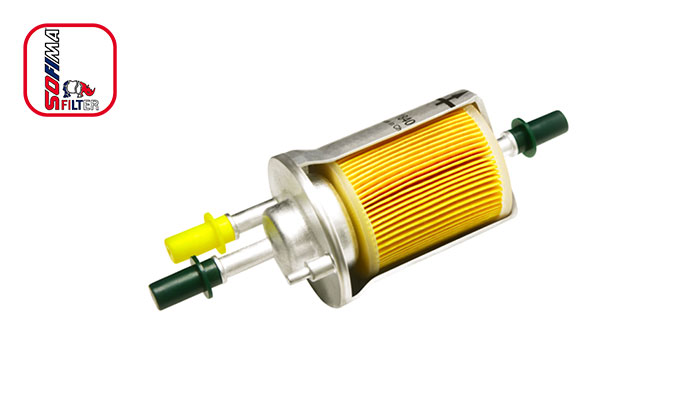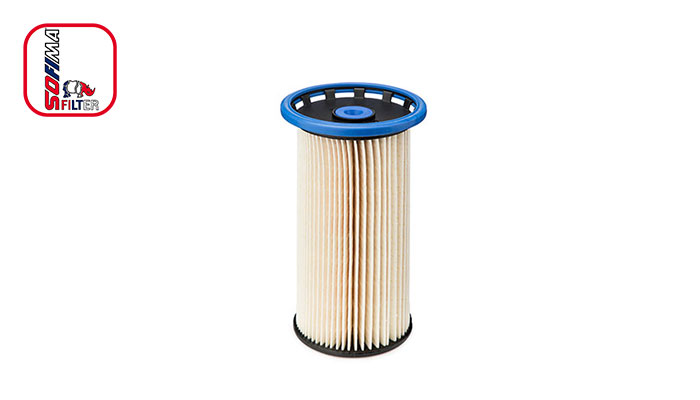The effective action of the fuel filter not only removes impurities but also ensures optimal combustion of petrol and diesel fuel, contributing to a reduction in consumptions.
Fuel filters play an essential role in ensuring the proper functioning of combustion engines. Their primary function is to provide a defensive ‘barrier’ in the fuel line of engines, preventing impurities and moisture in the fuel from reaching and possibly damaging components such as injectors, cylinder liners and piston rings.
In diesel engines, the filter is crucial in protecting the injection system from the presence of solid particles, water, sludge and other harmful substances, which are unfortunately often present in products dispensed by fuel stations: a protection that, for quality aftermarket filters such as SOFIMA Filter, extends to the smallest particles, which can be as small as four microns.
The damage caused to engines by fuel contamination is considerable: today, unfortunately, there are frequent cases of impurities in petrol station tanks, subject to water seepage and the formation of algae and mould, or of fraud by dishonest operators, carried out by adding oil processing waste and chlorine.
There is, however, a question that motorists often ask themselves: is it true that the fuel filter also has an influence on consumption? In other words, is its periodic replacement necessary not only to provide better protection for engines, but also to avoid wasting petrol and diesel?
The answer to these questions is yes, and the technical explanation is quite simple. A filter that is used for too long runs the risk of becoming clogged, thus reducing the effectiveness of its action and lowering the pressure in the fuel circuit.
This can lead to sub-optimal atomisation of the fuel molecules and, therefore, to a mixing ratio with the air that does not correspond to the manufacturer’s specifications: combustion may be incomplete, which reduces the power output of the engine. At that point, in order to ensure normal engine operation, its electronic control unit will increase the amount of fuel injected into the combustion chamber, thereby increasing fuel consumption. In addition, a clogged filter causes an increase in the pressure of the fuel supply system, an increase that is borne by the low-pressure pump, which, in order to cope with this increase in pressure, absorbs more electricity, all to the detriment, once again, of overall consumption. But that is not all.
The quality of SOFIMA filters
The most important component of a filter is the filter element; the fuel flows through it, leaving behind any impurities. If the filter is of low quality and has been made from poor materials or with inadequate production processes, the impurities are not retained effectively, thus creating the danger of clogging the injectors or, at the very least, adversely affecting the vehicle’s fuel consumption. Choosing a filter simply because it costs less than others may therefore prove to be a bad deal for the consumer. Not to be overlooked is also the tangible risk that a poor-quality filter may be a source of impurities, losing particles of which the filter material is made, or residues from processing in the assembly areas. It is no coincidence that among the rigorous tests to which SOFIMA filters are subjected, cleanliness is of paramount importance in guaranteeing the filter’s performance.
The filter material used by SOFIMA for its filters is produced in-house in the UFI Filters Group plants, to which SOFIMA belongs, and consists of synthetic fibres or cellulose. The spaces between the pleats are uniform and dense, guaranteeing benefits such as high precision and a greater filtering surface area, excellent resistance to fuel pressure and a longer service life, while at the same time reducing the pressure drop that the filter offers when the fuel flow passes through. These are, after all, products corresponding to the original equipment supplied to major car manufacturers.
An example is the S 1833 B aluminium body filter for Volkswagen, SEAT, Skoda and Audi applications.
Beware of diesel
Of all the fuels available, diesel is often the one with the highest impurity content. This is why the requirements placed on filters for diesel engines, which are mainly used in commercial vehicles today, are more stringent. The filter element of the SOFIMA filter intended for diesels is therefore made of cellulose-based synthetic material, or polymer fibres, offering high efficiency in its filtering action, as well as excellent separation from water, high solid particulate retention capacity and minimal resistance to pressure drop.
One example is the S 6038 NE filter for the Volkswagen Group’s most popular engine, the EA 288 EVO 1.6 and 2.0 litre for MQB platforms. A diesel filter composed of cellulose and synthetic fibres with high water separation capacity.
Long life, but not eternal
The effectiveness of a filter decreases with the passage of time and kilometres, so all manufacturers expect it to be replaced periodically. Typically for diesel cars every 40,000 km and every 20,000 km for petrol cars.
In any case, it is important to always scrupulously adhere to the service instructions provided by the vehicle manufacturer and to replace the filter whenever there is any doubt that ‘dirty’ fuel has been used or that the engine fuel system is malfunctioning.




